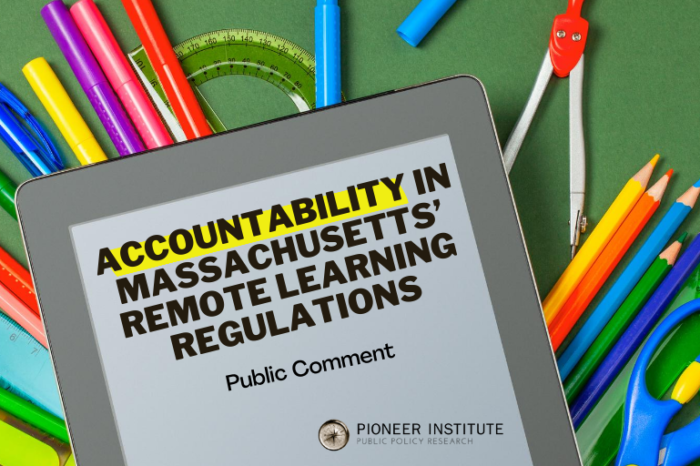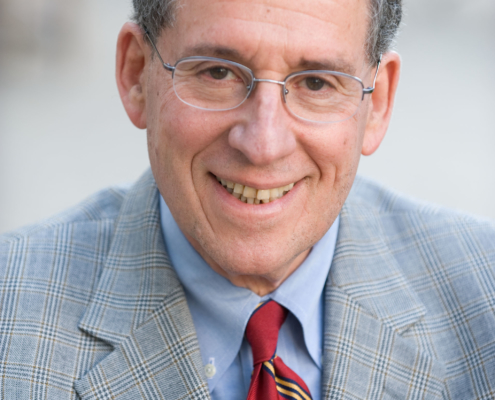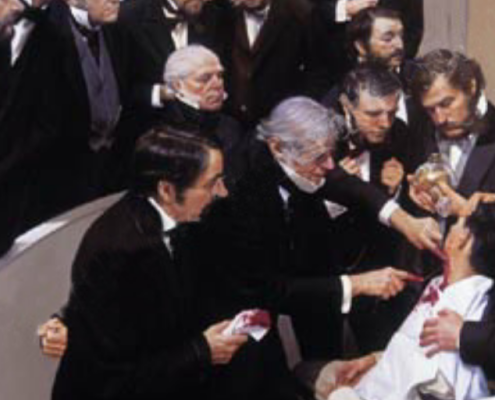MA’s Remote Learning Regs Should Specify Consistent District Grading Policies, Return of MCAS in 2020-21
Critical for high expectations, accountability to return after lost spring
BOSTON – The COVID-19 pandemic-related revisions to Massachusetts’ remote learning regulations should restore state and local accountability by specifying that any remote academic work shall, to the same extent as in-person education, prepare students to take MCAS tests, and that grading criteria should be the same across in-person, remote, and hybrid learning environments, according to a new policy brief published by Pioneer Institute.
“Unlike last spring, the Commonwealth has had plenty of notice that schools would likely be at least partially remote in the fall,” said Jamie Gass, Pioneer’s director of education research and policy. “It’s imperative that the state Department of Elementary and Secondary Education send a clear and explicit message that core academics, grading, and MCAS expectations will be fully restored in the 2020-21 school year.”
Due to COVID-19, MCAS was canceled in the spring of 2020, and the Massachusetts Teachers Association supports pending legislation that would cancel MCAS for four years.
A database of Massachusetts school district reopening plans published by Pioneer Institute finds that as of August 18, about 90 percent of all students are enrolled in districts that have announced their plans. A full 200 districts, representing 526,229 students, have decided to reopen with a hybrid of in-person and remote learning options for parents. Fifty-five districts, representing 251,172 students, have opted to reopen fully remote. Since that time, Boston announced plans to reopen remotely.
The policy brief, “Accountability in Massachusetts’ Remote Learning Regulations,” written by David S. Clancy and Dr. John G. Flores, serves as Pioneer’s public comments on the proposed state regulations, which will be submitted to the Massachusetts Department of Elementary and Secondary Education.
About the Authors
David S. Clancy, a resident of Concord, Massachusetts, is a partner in the law firm Clancy & Shine LLC, which focuses on civil disputes. Mr. Clancy was previously partner at an international law firm, from which he retired after a 20-year career, also practicing civil litigation. Among other professional activities, Mr. Clancy served three terms on the Board of Editors of the Boston Bar Journal, and has published multiple articles in that and other legal publications.
Dr. John G. Flores is CEO and executive director emeritus of the United States Distance Learning Association, and an authority in the field of education, technology, and telecommunications. Flores led a Global Association focused on the application of distance learning for varied constituencies using varied technologies. He has held leadership positions as a School Superintendent, University Executive Dean and Business CEO for Distance Learning companies. He received his M.A. from Boston University and his Ph.D. from the University of Connecticut focusing on educational technology, instructional design and leadership.
Mission: Pioneer Institute develops and communicates dynamic ideas that advance prosperity and a vibrant civic life in Massachusetts and beyond.
Vision: Success for Pioneer is when the citizens of our state and nation prosper and our society thrives because we enjoy world-class options in education, healthcare, transportation and economic opportunity, and when our government is limited, accountable and transparent.
Values: Pioneer believes that America is at its best when our citizenry is well-educated, committed to liberty, personal responsibility, and free enterprise, and both willing and able to test their beliefs based on facts and the free exchange of ideas.
Get Updates on Our Education Research
Related Research




















